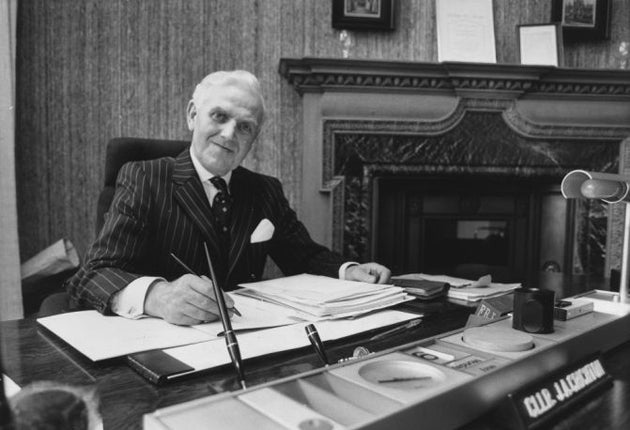John Crichton: Socialist politician who masterminded the regeneration of the port of Leith

Few of us can claim that, single-handedly, we have brought about a major success story in urban regeneration.
But if he were not such a modest and unassuming man, this is precisely the claim that could have been made by John Crichton, the gentle and extremely effective councillor, and later convener of Lothian Regional Council until his retirement and its demise.
Crichton was responsible for the impressive waterfront development of Leith, the historic Port of Edinburgh. Architects and planners from many countries have either made special journeys, or combined a visit to the Edinburgh International Festival (of which Crichton was a pillar) with a trip to view the development. One of Crichton's greatest joys in life was to take visitors on a conducted tour of the waterfront development as it was emerging as an architectural triumph.
John Crichton was born in 1916, the son of a printer. On his return from France in 1918, and as a result of his terrible experiences, his father became a member of the Salvation Army and one of the early moving spirits of the Labour Party in Scotland.
He was the editor of the influential paper The Clarion, which was the intellectual sustenance of so many socialists in the 1920s and 1930s. Crichton himself was a Salvationist all his life, and was saddened by the disbanding of the Leith branch in 2005.
In September 1939 he volunteered and became a commando. He once told me that the action which he saw, from Normandy to the Elbe, was not nearly so tough as the training around Fort William and Ben Nevis, where the monument to the commandos now stands.
Elected to Edinburgh Town Council in 1947, representing Leith, he served continuously for 35 years. With his wife, Isa – like him an energetic idealist – he ran a small grocery shop in Leith's Ferry Road. It was an occupation which gave him the opportunity to attend Edinburgh Town Council meetings. To gain a living wage, Crichton would remain open on those evenings when there were no council demands for his presence, serving his customers – and getting to know his voters.
I first met Crichton in 1957 when I was canvassing for his Leith Council neighbour, the feisty Annie Simpson. No one, as night drew in, was more willing to climb that last tenement staircase to the very top in order to solicit votes. The political cradle in which Crichton grew up included Jimmy Hoy, the first Labour MP for Leith and Harold Wilson's fisheries minister; Councillor Mrs Barbara Woodburn, wife of Atlee's Secretary of State for Scotland; and Sam McCluskie, future general secretary of the National Union of Seamen and Treasurer of the British Labour Party.
On 2 January 1979, when most of Scotland was recovering from the New Year, the ever-abstemious Crichton took the Secretary of State for Scotland, and later European Commissioner in Brussels, Bruce Millan, for a walk along the waterfront at Leith. It was a day of sleet and snow. For 40 years, during the Second World War and its aftermath, the historical Port of Leith had been in gradual decline. The bigger ships and tankers preferred Grangemouth. Once proud Leith was in danger of becoming a poor and rundown adjunct to Edinburgh. Crichton persuaded Millan, a most receptive, intelligent and effective minister, to consider a special project. Millan, who had the respect of both the Prime Minister, Jim Callaghan, and the Chancellor, Denis Healey, came up with a £5m kick-start for the Leith project.
Now, 30 years later, Leith has some of the most highly rated restaurants in Europe as well as some excellent residential blocks and shopping facilities. The prize-winning and distinguished restaurateur Martin Wishart told me that "Without the waterfront development, I and other restaurateurs would not have come to Edinburgh. Crichton set in motion the imaginative project which made it possible for us."
Without Crichton, this simply would not have happened. Eric Milligan, Lord Provost of Edinburgh from 1995-2003, who knew and worked with Crichton for half a century, summed him up as "a genuine socialist and idealist – such a gentleman that he wanted to achieve the socialist dream without hurting any individual." Tom Aitchison, once chief executive of Lothian Council and currently chief executive of Edinburgh City Council who, lived in the same street and knew Crichton from childhood, said, "John Crichton was a man of exemplary integrity. He was respected by his political opponents and the professional staff of the Council."
John Crichton, grocer and politician: born Stockbridge, Edinburgh 4 October 1916; elected to Edinburgh town council 1947-1974, to Lothian regional council 1974-82; convener finance committee, Lothian region 1974-78; council convener 1978-82; married Isa (one son, two daughters); died Leith 23 June 2010.
Subscribe to Independent Premium to bookmark this article
Want to bookmark your favourite articles and stories to read or reference later? Start your Independent Premium subscription today.

Join our commenting forum
Join thought-provoking conversations, follow other Independent readers and see their replies